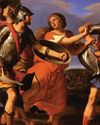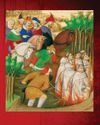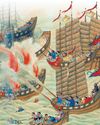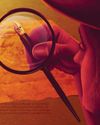CATEGORIES
Categories

HELL IN ITALY
The Allied invasion of Italy in 1943 was envisaged as a swift push on Rome. Yet, as James Holland explains, by the end of the year, the campaign was stymied by German defences far from the capital

Anne Boleyn's fatal French connection
John Guy and Julia Fox reveal how international diplomacy supercharged the rise of Henry's VIII's second wife and hastened her fall

"It was Joan of Arc who persuaded the French that they could win"
Jonathan Sumption speaks to Rob Attar about the final volume in his epic history of the Hundred Years' War, which reveals how the French turned the tide against the English monarchy

A woman's world
BRONWEN RILEY appraises an irreverent study that examines the Roman empire through the lives of 21 of its female subjects, from fearsome queens to vestal virgins

Templars on trial
From 1307, members of the Knights Templar were beaten, brutalised and put to death on charges of heresy, Satanism and mass murder. But, asks Steve Tibble, were this elite band of holy warriors fitted up for crimes they didn't commit?

Ignatius of Loyola 1491-1556
Children's Commissioner for England Dame Rachel de Souza chooses

Eleanor Glanville The butterfly collector
Today, insects are seen as a vital part of our ecosystem, but in the late 17th century, they were often overlooked by science. PATRICIA FARA tells the story of a groundbreaking lepidopterist whose research provided solace from a turbulent personal life

WHEN PIRATES RULED ASIA'S WAVES
Pirates didn't only spread chaos in Caribbean and Atlantic waters. Adam Clulow reveals how east Asian raiders terrorised China's shores from the 16th century

Voices from the picket line
LUCY ROBINSON enjoys a new history of the 1984-85 Miners' Strike that puts first-hand accounts from those involved front and centre

Golden boy
Over the past 200 years, Dick Whittington has become one of Britain's best-loved pantomime heroes. Yet, as Michael McCarthy tells Jon Bauckham, the real-life story that inspired Dick's rags to riches tale is even more remarkable than the fiction

HATE MAIL
The 19th and early 20th centuries saw an explosion of malicious letters penned by anonymous authors. As Emily Cockayne reveals via six cases, these messages often reflected the fears and prejudices that stalked Britain

"My historical research shows that much higher levels of inclusion are possible for people labelled disabled"
A new study by historian LUCY DELAP suggests we need to rethink the experiences of people with learning disabilities in the 20th century. Here she explains how many thrived in work and wider society

MY HUNT FOR JOSEF MENGELE
In 1949 the notorious Nazi doctor fled to South America. Three decades later, Gerald Posner (left) set out to track him down. Here the former lawyer tells us about his mission to catch the 'Angel of Death'

Have nations always used sport to launder their reputations?
As countries with questionable human rights records buy overseas teams and vie to host global tournaments, MATT MCDOWELL speaks to Matt Elton about the rise of 'sportswashing' - and whether sport and power have always gone hand in hand

Renaissance beauty tips
From snail-slime face cream to poisonous makeup, our podcast editor ELLIE CAWTHORNE discusses a recent episode on creative 16th-century beauty regimes

Follow the money
JANE HUMPHRIES reviews a wide-ranging but very readable study of the changing tides of global economics from the Great Depression to the present day

How life returned to the streets of Pompeii
With a new BBC TV series about Pompeii in the offing, Sophie Hay looks back 100 years to a dig that transformed our understanding of daily life on the city's streets

15 minute cities: 30 years in the making
UN's climate narrative reveals disturbing goals

Did they really have to fight to the finish?
From 1914, powerful voices called for the First World War to end in a negotiated compromise. Why were they ignored?

Narrative thread
CHRISTIENNA FRYAR is enthralled by the story of three enslaved women told by one simple artefact

How bias begins
ALEXANDER WATSON commends a powerful examination of the portrayals of Roma people in Europe through the centuries

Dead reckoning
JAMES LIN is impressed by a scholarly but readable look at what the tombs of ancient Chinese people reveal about past and contemporary beliefs and culture

ΚΕΕΡ CALM AND IGNORE THE ARMADA
What did English merchants and mariners do when a Spanish invasion fleet menaced the south coast in 1588? As Robert Blackmore reveals, they boarded their ships and carried on trading

Scotland's greatest victory
The image of plucky warriors sending a cocksure English army into flight has secured Bannockburn's status in the annals of Scottish history. Helen Carr chronicles the 1314 clash that transformed the balance of power between two warring nations

NORTHERN POWERHOUSE
During its turbulent four-century history, the kingdom of Northumbria clashed with Pictish warriors, Welsh kings and Viking raiders. Fiona Edmonds tells the story of an ambitious realm that changed the face of early medieval Britain

France in the dock
RICHARD J EVANS applauds a vivid account of the final days of the collaborationist French Vichy regime, and of the trial of its leader, Marshal Philippe Pétain

Walter Tull 1888-1918
MY HISTORY HERO

TOKYO IN RUINS
In 1923, a violent earthquake razed Japan's bustling imperial capital and killed more than 100,000 people. Christopher Harding explores the aftermath of the disaster - and its pivotal cultural and physical legacy

"In an inclusive public culture, Blake's is a great, passionate human voice"
PUTTING AWAY THE CAMPING GEAR AFTER THIS year's Glastonbury Festival, I found myself reflecting on the idea of alternative cultures. Since its origins, Glastonbury has always been political, and hosts a huge number of side discussions, concerts and seminars. It still gives money to Greenpeace, WaterAid and Oxfam, in addition to a host of local charities. As a festival of music and arts, it plays an important part in public discourse in these deeply polarised times - when, for instance, a journalist from The Times recently argued that the humanities are a waste of effort.

"Britain's first black editor achieved so much in such a short life"
WHEN I RECENTLY CAME ACROSS THE MAN considered Britain's first black editor, I was surprised that I had never before heard his name. Samuel Jules Celestine Edwards was born in Dominica, the youngest of 10 children, near the end of the 1850s. In 1870 he travelled to North America and then, some seven years later, to Edinburgh, where he worked as a labourer. He later spent time in Sunderland, where he reconnected with his Christian faith, practising as a Methodist, and became a vocal proponent of temperance.